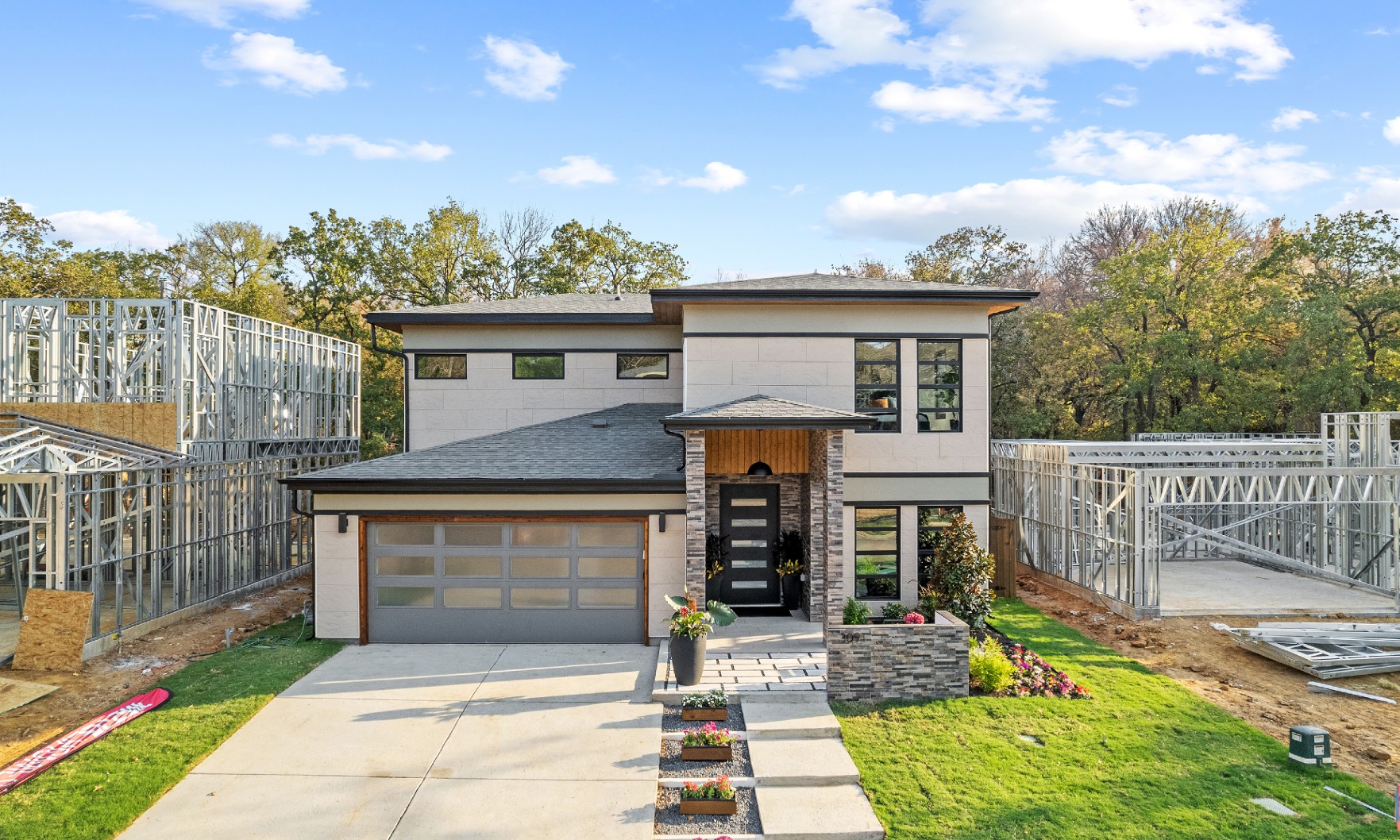Freshly relocated from the Seattle area, a family of four is now living in a mid-century modern home in Corinth. But not just in any home — it’s the prototype for a whole community of steel-framed houses built from recycled cars.

Corinth prototype (via Netze Homes)
Netze Homes, a construction startup in Lewisville, is constructing 17 steel-framed homes in the Dallas area — all made from recycled cars. The project is just one small facet of the company’s overarching mission to bridge the gap between design and construction while eliminating waste and increasing sustainability.
Working for 14 years as an architect, Netze Homes Founder Nejeeb Khan often wondered why projects didn’t go according to plan. It was easy to draw up a design and hand it over to builders, he found, but much harder to see that design actualized.
“All the workers in a house don’t work in tandem. They blame each other. They create problems for each other,” Khan told Dallas Agent. “As a designer or architect, we never see that.”
Khan eventually founded his own integrated design firm, where he prioritized the incorporation of engineers in the design process. The firm also utilized Building Information Modeling: in other words, 3D and 4D models that demonstrate the physical and functional characteristics of a given design.
Then, just before the start of the pandemic in 2020, Khan sold his integrated design firm because he wanted to focus on the construction side of the process.
“There were still so many problems that arose during [project] construction,” Kahn said. “Construction is inefficient. It takes a long time. It creates a lot of waste. I said, ‘We can construct in a better way than they are.’”
He founded Netze — a shortened name referring to the company’s “net zero” business model — in 2022 with the goal of super efficiency in construction that decreases waste while increasing quality and sustainability.
Building upon the kind of models he’d utilized at his first design company, Khan implements engineer-backed designs at Netze, using more drawings and models than traditional homebuilders.
“Digitization of construction is the key,” Khan said. “We are a digital construction company.”
Khan describes all the processes that go into building a home from scratch as falling into one of six categories: substructure/foundation, superstructure, service structure (including fixtures like plumbing and electrical wiring), interior finishes, exterior finishes and landscape. By digitally designing all aspects of the home at once, Netze can save time and optimize their designs.
Step one, like on a traditional homebuilding site, is still the creation of the substructure and superstructure. To do that, Netze’s team of contracted architects and engineers (located in Dubai and Bangalore) designs each home digitally using Advanced Cold Formed Steel Software (FRAMECAD), an engineering software that allows designers to test for accuracy, effectiveness, structural integrity and performance.
Those designs are then sent to the American team, which prints the individual steel studs in the Netze factory according to the measurements provided in the digital blueprint. From there, it’s on to the sub-contractors, who put the pieces of the puzzle together at the job site.
Netze calls the whole process “techstruction.” All elements of the home are created in tandem with structural engineers, electrical engineers, designers and more, so the building materials can be created and cut in a factory, eliminating the possibility of construction site waste or human measurement errors. And while other homebuilders are also digitizing their planning and design processes, Khan said no American company has invested as heavily on the manufacturing end.
But producing pre-sized building materials in-house isn’t the only way Netze cuts down on waste. In addition to the 17 recycled-car homes in Netze’s current pipeline, the company also aims to decrease operating costs for the consumer by creating the most energy-efficient homes possible.
Khan said there are several reasons why Netze homes use significantly less energy than traditional homes. For starters, all homes are triple insulated and encapsulated, meaning they’re airtight. While that requires a high-quality HVAC system to ensure proper airflow, it also brings the homeowner monthly savings on heating and cooling. Netze homes also lack an attic, which typically have poor ventilation and aren’t easily temperature controlled.
Netze’s prototype home in Corinth is also Energy Star certified and Green Building certified.
“People hear steel and they think ‘manufactured home,’” Khan said. “But steel homes are termite resistant, fire resistant and weather resistant. And we’re able to give savings to the customer because we’re not taking as much of a profit.”
A designer at heart, Khan also understands the importance of the physical details that can elevate a home. Inspired by the work of architect Frank Lloyd Wright, Netze’s mid-century modern designs feature touches such as floating walls, Level 4 drywall finishes, herringbone floors and casement windows.
Khan said these signatures are possible for one reason: Netze is saving money on waste.
“Our waste is only about 6%,” he said, attributing most construction issues to lack of coordination. “We work with many engineering consultants to make sure it’s seamless.”
Netze is currently building in five Dallas-area communities and, in all, has 125 homes coming down the pike; the neighborhood of recycled steel homes will be located in The Oaks, a pocket community in Corinth. All 17 homes in that project are expected to complete in April or May of next year — a speedy timeline for a residential construction site.
“The more you plan it, the less mistakes you have at the site,” Khan said. “We have it really all planned out to a T.”

